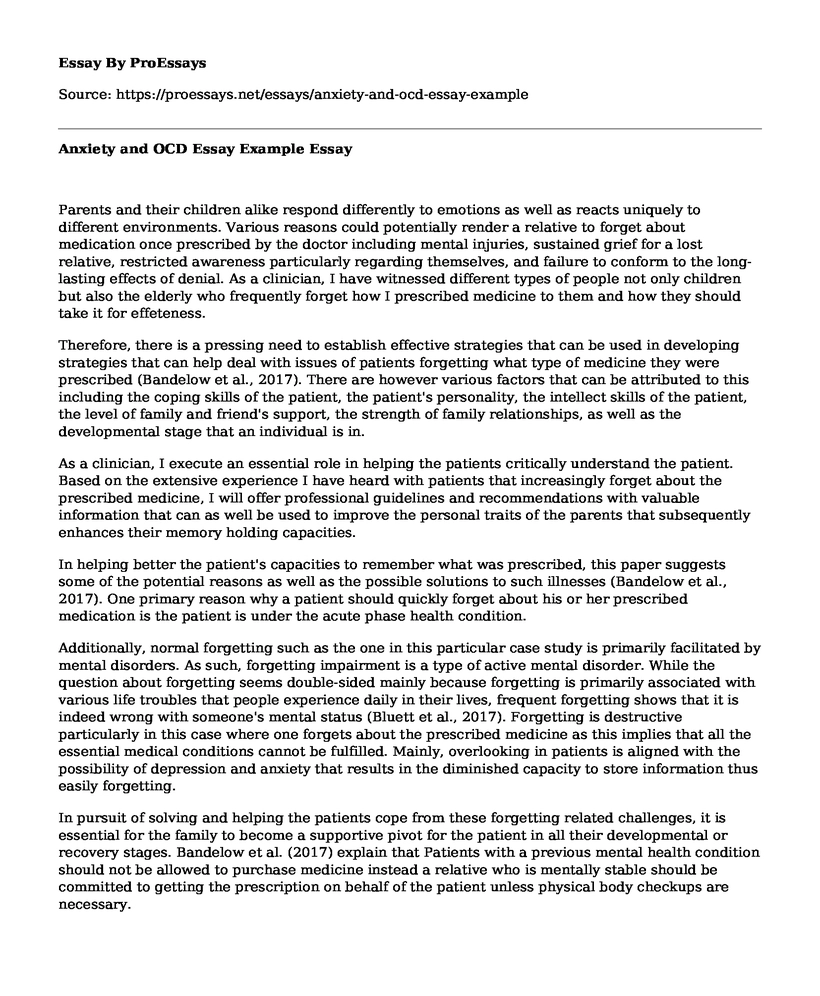Parents and their children alike respond differently to emotions as well as reacts uniquely to different environments. Various reasons could potentially render a relative to forget about medication once prescribed by the doctor including mental injuries, sustained grief for a lost relative, restricted awareness particularly regarding themselves, and failure to conform to the long-lasting effects of denial. As a clinician, I have witnessed different types of people not only children but also the elderly who frequently forget how I prescribed medicine to them and how they should take it for effeteness.
Therefore, there is a pressing need to establish effective strategies that can be used in developing strategies that can help deal with issues of patients forgetting what type of medicine they were prescribed (Bandelow et al., 2017). There are however various factors that can be attributed to this including the coping skills of the patient, the patient's personality, the intellect skills of the patient, the level of family and friend's support, the strength of family relationships, as well as the developmental stage that an individual is in.
As a clinician, I execute an essential role in helping the patients critically understand the patient. Based on the extensive experience I have heard with patients that increasingly forget about the prescribed medicine, I will offer professional guidelines and recommendations with valuable information that can as well be used to improve the personal traits of the parents that subsequently enhances their memory holding capacities.
In helping better the patient's capacities to remember what was prescribed, this paper suggests some of the potential reasons as well as the possible solutions to such illnesses (Bandelow et al., 2017). One primary reason why a patient should quickly forget about his or her prescribed medication is the patient is under the acute phase health condition.
Additionally, normal forgetting such as the one in this particular case study is primarily facilitated by mental disorders. As such, forgetting impairment is a type of active mental disorder. While the question about forgetting seems double-sided mainly because forgetting is primarily associated with various life troubles that people experience daily in their lives, frequent forgetting shows that it is indeed wrong with someone's mental status (Bluett et al., 2017). Forgetting is destructive particularly in this case where one forgets about the prescribed medicine as this implies that all the essential medical conditions cannot be fulfilled. Mainly, overlooking in patients is aligned with the possibility of depression and anxiety that results in the diminished capacity to store information thus easily forgetting.
In pursuit of solving and helping the patients cope from these forgetting related challenges, it is essential for the family to become a supportive pivot for the patient in all their developmental or recovery stages. Bandelow et al. (2017) explain that Patients with a previous mental health condition should not be allowed to purchase medicine instead a relative who is mentally stable should be committed to getting the prescription on behalf of the patient unless physical body checkups are necessary.
In developing a Pamphlet, it is crucial and worth noting that the sky is the limit. One has to be extensively creative and think outside the box (Bluett et al., 2017)). Creativity ensures that the Pamphlet attracts readers from different backgrounds and clients. Creativity ranges from the design and size of the Pamphlet to unique shapes used as well as the medium used to print them. Therefore, innovation is crucial.
Lastly, it is essential to establish the mood. An effective way through which one can effectively create the atmosphere in a Pamphlet is through utilizing detailed and comprehensive descriptions throughout the writing. In this way, the audience gets the feel of what they will probably experience upon using the suggested recommendations offered by the Pamphlet.
References
Bandelow, B., Baldwin, D., Abelli, M., Bolea-Alamanac, B., Bourin, M., Chamberlain, S. R., & Grunblatt, E. (2017). Biological markers for anxiety disorders, OCD and PTSD: A consensus statement. Part II: Neurochemistry, neurophysiology, and neurocognition. The World Journal of Biological Psychiatry, 18(3), 162-214.
Bluett, E. J., Homan, K. J., Morrison, K. L., Levin, M. E., & Twohig, M. P. (2014). Acceptance and commitment therapy for anxiety and OCD spectrum disorders: An empirical review. Journal of anxiety disorders, 28(6), 612-624.
Cite this page
Anxiety and OCD Essay Example. (2022, Aug 23). Retrieved from https://proessays.net/essays/anxiety-and-ocd-essay-example
If you are the original author of this essay and no longer wish to have it published on the ProEssays website, please click below to request its removal:
- The Psychological Concept of Individual Well-Being and Happiness Essay
- Counselor for Children Undergoing Through Stress Related Issues Job Interview
- Essay Sample on Coping with Anxiety: A Key to Overcoming Stress
- Essay Example on Overcoming Internal Conflict: A Difficult but Necessary Journey
- Essay Sample on Therapists Confront Death, Grief, Emotions
- Depression: Unlocking the Door to Recovery Paper Example
- Managing Diversity and Decision-Making in Organizational Behavior: A Case Study Analysis







